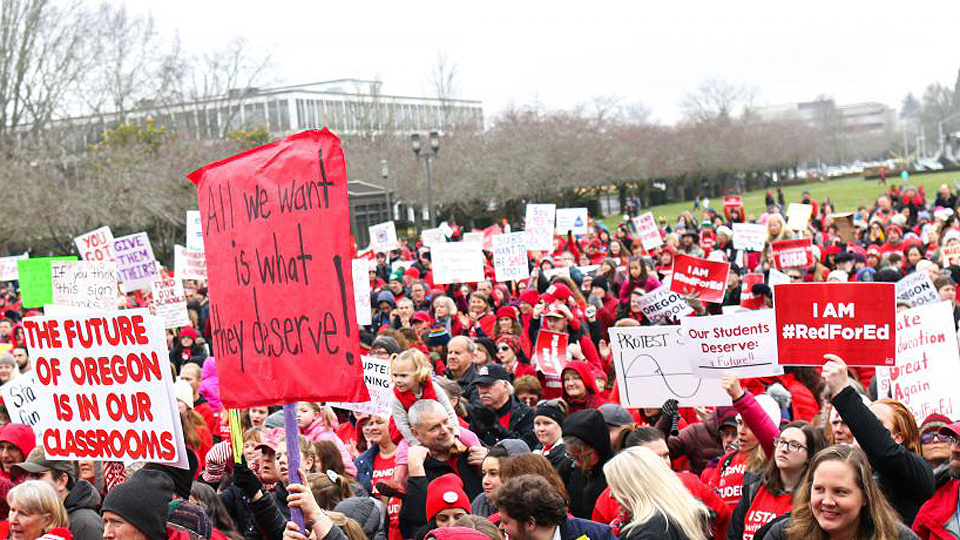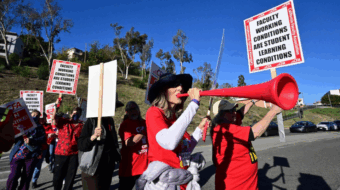
PORTLAND, Ore.–More than 20,000 Oregon public school teachers statewide — at least two-thirds of all teachers in the state — walked out of classes on May 8 to demand more state funds to fix crumbling schools and provide up-to-date textbooks.
Tens of thousands of students and parents joined the teachers, with 25,000 people marching in Portland alone. The Oregon Education Association, the state’s NEA affiliate, organized the walkout, and NEA national President Lily Eskelsen-Garcia addressed the crowd.
“Oregon schools have been starved and they are in a funding crisis,” she told the biggest rally, of more than 25,000 people, in Portland.
Teachers, in Oregon and elsewhere, are “standing up, marching on, walking in, using their teacher voice — megaphone optional — to demand that our schools have everything they need, so our students can be everything they want to be,” Eskelsen-Garcia, a primary grades teacher from Salt Lake City, said the day before, on National Teachers Day.
“Educators have marched in the heat, rallied in the rain, knocked on doors, walked with students and parents, made really creative signs, and talked to anyone and everyone, all in an effort to ensure students have the opportunity and schools they deserve.”
“In this national #RedforEd movement, we’ve forced politicians to listen, to pay attention to the years of chronic neglect that have taken a toll on students and schools,” she added.
Eskelsen-Garcia is right about the national movement, and Oregon’s one-day walkout, to demand the state legislature devote more funds to the schools from an upcoming corporate tax increase, is just its latest manifestation.
For more than a year, a wave of teacher walkouts, joined — and often led — by parents and students, has demanded state lawmakers devote more money to fix crumbling schools, replace outdated textbooks and, especially in red states, raise teachers’ pay.
The first and largest walkout came when the West Virginia legislature offered its state’s teachers a 1% raise, a huge hike in health insurance premiums and a pension cut. That forced every Mountaineer State teacher to walk — despite a no-strike law — and they shut the schools for nine days until they won in spring of 2018.
And when the GOP-run legislature tried to roll back some of those gains several months ago, the West Virginians walked out again. The legislature caved after nine hours.
Other forced teacher walkouts occurred in Oklahoma, Arizona, Kentucky, Colorado, Los Angeles and at charter schools in Chicago. In each, skimpy state funding was the main issue, not pay.
“Lawmakers are considering the Student Success Act, which would invest $2 billion in our schools — a
18% increase,” the Oregon Education Association said in its flyers for the strike rallies statewide.
“Oregon schools are in crisis after decades of disinvestment” with “one of the largest class sizes in the nation,” the flyer added. “We have to fix this.”
“Today is about letting Salem” — the state capital — “hear us,” Beaverton high school mathematics teacher Lizzy Ray, who emceed the Portland rally, told the crowd.
As might be expected, GOP lawmakers opposed both the corporate tax hike and directing the money to the schools. State senators delayed votes on both the tax package and the school funding measure by refusing to show up at the capitol building in Salem, thus preventing a quorum.
Suzanne Cohen, president of the Portland Teachers Association, told local media the GOP move was “incredibly disappointing.” Oregon Public Radio reported some of the GOP state senators may have even left the state to prevent themselves from being found by state police and brought back to Salem.
The schools package, HB3427, would direct $2 billion every two years to schools, with the money coming from a new 0.57% tax on sales inside the state’s borders that exceed $1 million. Grocers, gas stations and some health care providers would be exempt and businesses could subtract 35% of their labor and capital costs first.
That means the tax would hit Oregon’s 40,000 largest businesses, including world-renowned names such as Nike.










